Insights Leona Flores Rocking cancer research
As an architectural engineering student at California Polytechnic State University in San Luis Obispo, Leona Flores found herself captivated by the design potential of concrete. In one of her classes, she first learned about the renowned architect Louis Kahn and the Salk Institute. She convinced her dad to take her to San Diego to see the architectural landmark during her senior year.
“I had studied the design of the Salk Institute, but it was a totally different experience to see it in person,” says Flores. “Never did I imagine that I would be the executive director of the Institute’s Cancer Center so many years later.”
Early Life
Flores was born in the United States island territory of Guam, but raised in Huntington Beach and Laguna Niguel, California, when her father was transferred to the Naval Base San Diego. She came from a large family with three brothers and more than 50 first cousins. “Guam is the westernmost US territory and closest to the International Date Line, so we like to say that Guam is where America’s day begins,” says Flores. “A lot of my family still lives there.”
Path to Salk
Flores loved math and architecture, so she became a civil engineer and later worked in structural engineering for more than 10 years. Although she enjoyed being an engineer, she felt a pull toward science and medicine. So, she cut back on her job and enrolled in community college to pursue premedical studies. She later took a job at the Orange County coroner’s office, where she worked as a forensic technician.
“I completed more than 3,000 autopsies and worked closely with the pathologists,” says Flores. “Everything I was learning in school, anatomy and physiology, was right there on the table in front of me.”
This role eventually turned into a position at Children’s Health of Orange County (CHOC), where Flores worked for a physician who headed the then NICHD Brain and Tissue Bank for Developmental Disorders. She also had the opportunity to work in his molecular biology lab, which sparked her interest in pursuing a PhD instead of an MD.
After she completed her bachelor’s in biological science at California State University, Fullerton, Flores was accepted to UC San Diego for her PhD in biomedical engineering. She also completed her postdoctoral fellowship at UC San Diego, but she didn’t want to pursue academia. Instead, she became an associate editor for the American Association for Cancer Research, where she worked under the director of the UC San Diego Moores Cancer Center.
This role morphed into scientific administration, and she started to get involved with developing scientific presentations, writing grants, and establishing interdisciplinary collaborations as director for research development and collaborations at Moores Cancer Center. In 2020, she was recruited by Professor Reuben Shaw to be the executive director of the Cancer Center at Salk. “Besides the exceptional science that I knew happened at Salk, I couldn’t believe I was going to work at the architectural landmark I once aahed over as an engineering student,” says Flores. “Talk about full circle!”
Day-to-Day
Flores spends her day organizing meetings, symposia, and retreats, as well as finding new opportunities for trainees. Her goal is to raise the Cancer Center’s profile within the scientific community and among granting agencies. She also works on grants, including a more than 1,000-page renewal to allow Salk to keep the title of National Cancer Institute (NCI)-Designated Cancer Center. Being NCI-designated means that the Cancer Center conducts groundbreaking research focused on developing new approaches for preventing, diagnosing, and treating cancer.
“Having this designation is the gold standard of cancer centers. When you’re NCI-designated, you have a seat at the table with organizations that direct patient care,” says Flores. “Our discoveries set the foundation for the development of effective therapeutics.”
Inspiration
“While Salk does not directly participate in many clinical studies, our work still comes down to helping people. I know this because my brother passed away from chronic lymphocytic leukemia three years ago,” says Flores. “When it transformed into a more aggressive cancer, I wished he had had more treatment options. I know that Salk is where I need to be to support researchers in making scientific discoveries that could turn into effective therapeutics.”
Riding and Rocking for Research
Flores is an avid cyclist and is passionate about supporting Padres Pedal the Cause hosted by Curebound. The cycling event, which began in 2013 and takes place around every spring, raises money for six local cancer research organizations, including Salk’s Cancer Center. Since it began, Salk scientists have been awarded more than $1.25 million in pilot grants.
“Pedal the Cause is such an amazing event, because the money truly does go directly to fund local cancer research,” says Flores.
This year, Flores joined a group of local oncologists who all enjoy playing music in their not-so-free time. She plays keyboard and drums with her band, aptly named Adverse Events, at various venues for cancer-related gigs. “We’re not great, but we’re not awful,” laughs Flores.
Long View
Flores recognizes that successful cancer research depends on training the next generation of scientists. She organizes training opportunities so that young researchers can hear talks from physicians and other scientists, as well as meet the people affected by these conditions. “It’s important for us all to remember why we’re doing what we’re doing,” says Flores. “Our trainees need to see the impact they’re making as well as understand how much further we still have to go.”
Support a legacy where cures begin.
Featured Stories
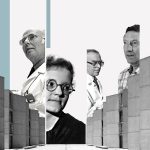 Journey of a lifetime—The Cancer Center at Salk celebrates 50 years of life-changing discoveriesSalk’s Cancer Center has become a powerhouse of critical discoveries that have led to treatments and remissions for patients. The Center’s mission is to make current generations the last to see cancer as anything other than a routine diagnosis.
Journey of a lifetime—The Cancer Center at Salk celebrates 50 years of life-changing discoveriesSalk’s Cancer Center has become a powerhouse of critical discoveries that have led to treatments and remissions for patients. The Center’s mission is to make current generations the last to see cancer as anything other than a routine diagnosis. 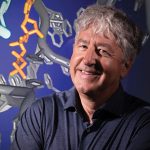 Introducing Salk’s newest president, Gerald JoyceJoyce, a pioneer in the field of test-tube evolution, succeeds Professor Rusty Gage, who will return to his lab following a transformative leadership tenure. Joyce assumed the role April 21, 2023.
Introducing Salk’s newest president, Gerald JoyceJoyce, a pioneer in the field of test-tube evolution, succeeds Professor Rusty Gage, who will return to his lab following a transformative leadership tenure. Joyce assumed the role April 21, 2023. 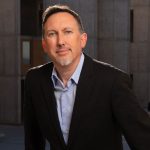 Reuben Shaw—Unexpected resultsIt’s not every day a young scientist gets a jaw-dropping result he knows no one will believe. But that’s exactly what happened to Professor Reuben Shaw 20 years ago, in the spring of 2003.
Reuben Shaw—Unexpected resultsIt’s not every day a young scientist gets a jaw-dropping result he knows no one will believe. But that’s exactly what happened to Professor Reuben Shaw 20 years ago, in the spring of 2003.
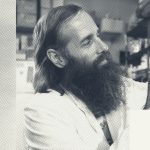 Tony Hunter—How an animal virus discovery more than 40 years ago led to one of today’s most successful cancer drugsThe story behind how Hunter discovered the first kinase that phosphorylates the amino acid tyrosine. The finding led to the development of Gleevec, a medication that is now routinely used to treat chronic myelogenous leukemia (CML).
Tony Hunter—How an animal virus discovery more than 40 years ago led to one of today’s most successful cancer drugsThe story behind how Hunter discovered the first kinase that phosphorylates the amino acid tyrosine. The finding led to the development of Gleevec, a medication that is now routinely used to treat chronic myelogenous leukemia (CML).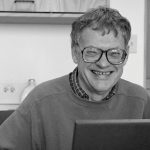 Charles Stevens—A beautiful mind, and a heart to matchA pioneer in neuroscience, Distinguished Professor Emeritus Charles F. Stevens died peacefully on October 21, 2022, at his home in San Diego. He was 88.
Charles Stevens—A beautiful mind, and a heart to matchA pioneer in neuroscience, Distinguished Professor Emeritus Charles F. Stevens died peacefully on October 21, 2022, at his home in San Diego. He was 88.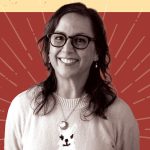 Leona Flores—Rocking cancer researchFlores had studied the design of the Salk Institute as an architectural engineering student, but never did she imagine that she would be the executive director of the Institute’s Cancer Center years later.
Leona Flores—Rocking cancer researchFlores had studied the design of the Salk Institute as an architectural engineering student, but never did she imagine that she would be the executive director of the Institute’s Cancer Center years later.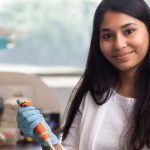 Payel Mondal—Cancer researcher by day, financial planner by nightMondal is a postdoctoral researcher in Assistant Professor Christina Towers’ lab where she studies the mechanisms involved in cancer progression. Her hope is that her projects will someday be translated into therapeutics to help people.
Payel Mondal—Cancer researcher by day, financial planner by nightMondal is a postdoctoral researcher in Assistant Professor Christina Towers’ lab where she studies the mechanisms involved in cancer progression. Her hope is that her projects will someday be translated into therapeutics to help people.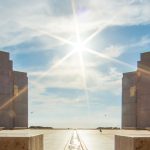 Salk receives $1.5 million from the Sol Goldman Charitable Trust and $1.25 million from The Jay and Sarah Flatley FoundationThe Salk Institute is grateful to its many generous supporters.
Salk receives $1.5 million from the Sol Goldman Charitable Trust and $1.25 million from The Jay and Sarah Flatley FoundationThe Salk Institute is grateful to its many generous supporters.





















































